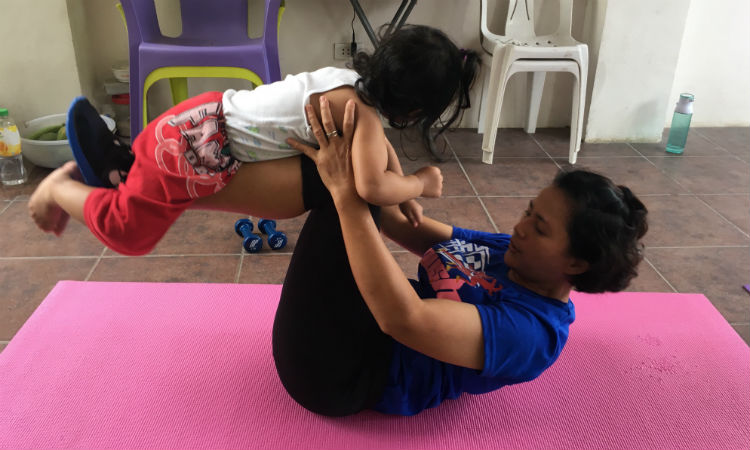
'Tis the season for New Year’s resolutions and, for many moms, this means resolving to get healthier. There's nothing wrong with that, but what we really need to be careful about are the words we use when talking about our health goals in front of our impressionable little ones.
“That’s it—I’m finally losing the baby weight!” “You’re the reason Mommy needs this extra cookie!” Simple statements, maybe even meant to be funny, but our kids may internalize unhealthy messages about food and their bodies that they could carry with them into adulthood.
Watch What You Say About Food
"Oh, I can't," you say, turning down the piece of cake. "I need to be good."
How many times a week do you say the words "good" or "bad" when it relates to food? Dr. Julia Baird, a clinical psychologist who specializes in working with patients who have eating disorders, says that you should try not to qualify food by indicating that some foods are “bad” foods (high calories, high fat, high carb) and some foods are “safe” foods (meaning low calorie). This kind of talk supports eating disordered thoughts and behaviors.
Instead, try to refer to foods as "healthy" or "unhealthy." Attaching a moral judgment to food means that if your child eats a "bad" food, they may feel guilty and in turn think that they’re bad. Internalizing this idea of food could negatively impact their self-esteem, which contributes to the likelihood of them developing an eating disorder later on in life.
"I’ve been really good this week, I deserve this cookie."
Comments like this frame food as a reward, not something to nourish your body or enjoy. If your child views food as a reward, they might eat when they're not hungry just because they’ve been offered something “special.” It could create an unhealthy emotional attachment to food. As Jillian Lampert, chief strategy officer at The Emily Program, a national leader in treatment for eating disorders, puts it: “Food is fuel and using it as a reward teaches that it is something else.”
"I’ve had a really rough day," you say as you reach for the pint of ice cream. "I can cheat."
Again, it’s using food as a reward, but what you’re also showing your child is that food can be used to handle emotional distress. It’s taking them out for an ice cream cone when they’re upset because they didn’t make the team, or giving a younger child a lollipop to distract them after a bad fall off their bike. In those cases, Lampert would urge parents to “distract them with other things that doesn’t teach them to soothe themselves with food.” Lead by example and reward yourself with a bubble bath or another non-food treat.
[I]f they hear their parents making derogatory comments about their bodies, they will remember this and see their own bodies as something to hate and feel shame about.
Watch What you Say About Your Body
"Time to lose the baby weight!"
When this is said in front of the baby, who may be just 4 years old, what’s the message? Comments about how your body has changed postpartum could sink into impressionable brains and give them the idea that you regret having children.
"I hate my [thighs, stomach, stretch marks, etc.]"
The words can just slip out, particularly if your body went through a lot of changes during pregnancy and looks vastly different postpartum than it did before. But someday, your child may hear, “You look just like your Mom.” If they’ve never heard you say a positive word about your own looks, what are they now going to think about themselves?
Children absorb so much during their formative years, and in her work with patients Baird has found that “if they hear their parents making derogatory comments about their bodies, they will remember this and see their own bodies as something to hate and feel shame about.”
"Look what I can do!"
When talking about the changes you’re making in your life as a result of your resolutions, phrase those changes in terms of what they’ll allow you to do, not how you’ll look. For example, "Mommy’s going running because I want to improve my endurance for the awesome hikes we’re going to go on this summer." Or, "I’m lifting weights so I’ll become stronger and can pick up more groceries without hurting my back." When talking with our kids about our bodies, Lampert thinks it’s much better to “show them how you move your body joyfully, demonstrate self-care and how you rest your body” than to speak negatively about it.
Finally, Relax
Don’t worry, a child doesn’t develop an eating disorder just because of the words you say. But by changing how you talk about food and your body, you can hopefully mitigate some of society’s influences and build your child’s self-esteem.
In the midst of the pressure to join a gym, try yoga or count food points, maybe ask yourself why you’re jumping through those hoops? Is it really because you need to run after and catch your toddler when he makes a break for it the parking lot? Or have you bought into society’s idea of what a post-baby body “should” look like?
In choosing your words with care around your children, take a second to examine what they reveal about how you view food and your body. In doing so, you might come to a new peace with yourself. Which is definitely a New Year’s resolution worth making.



